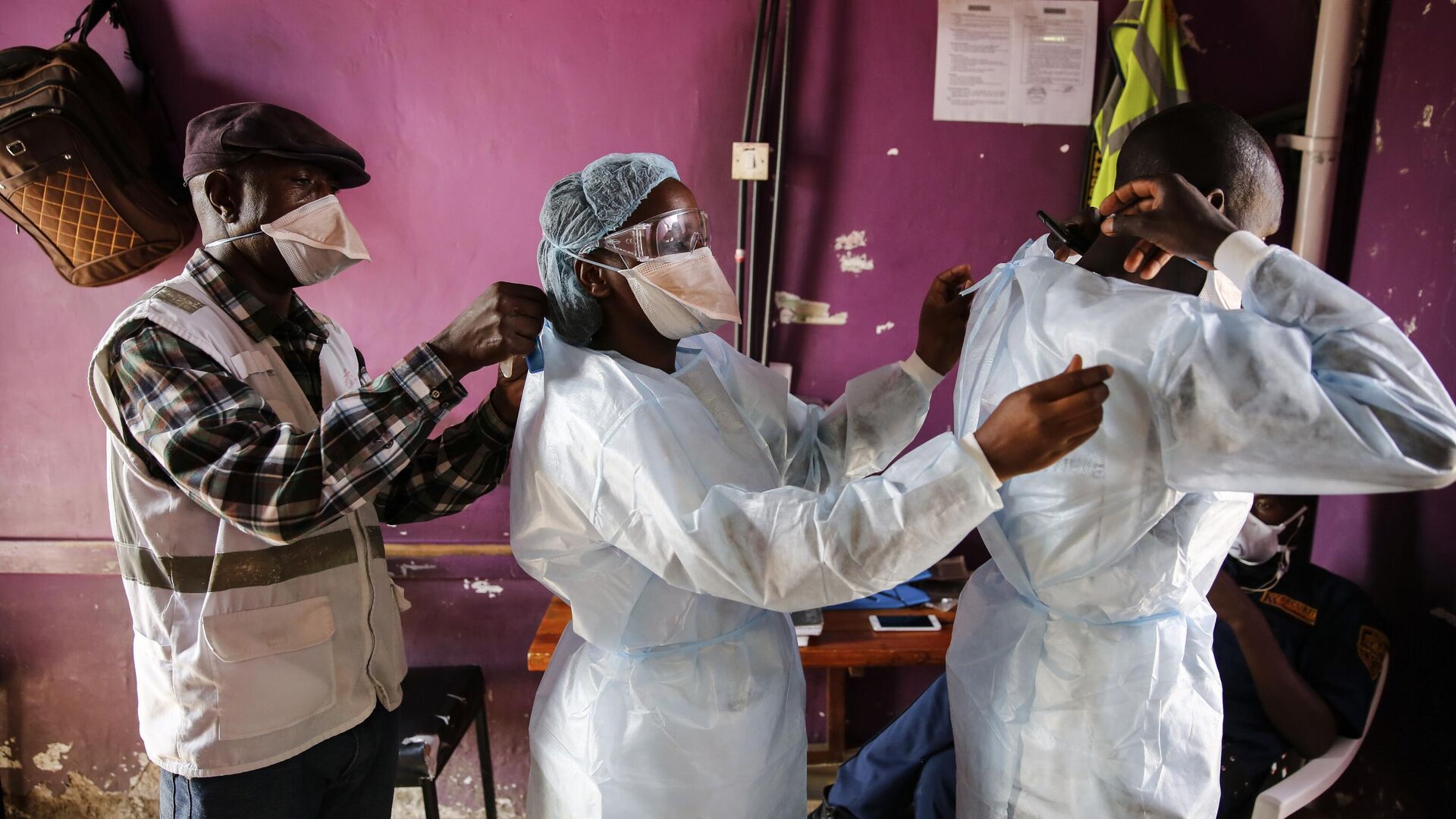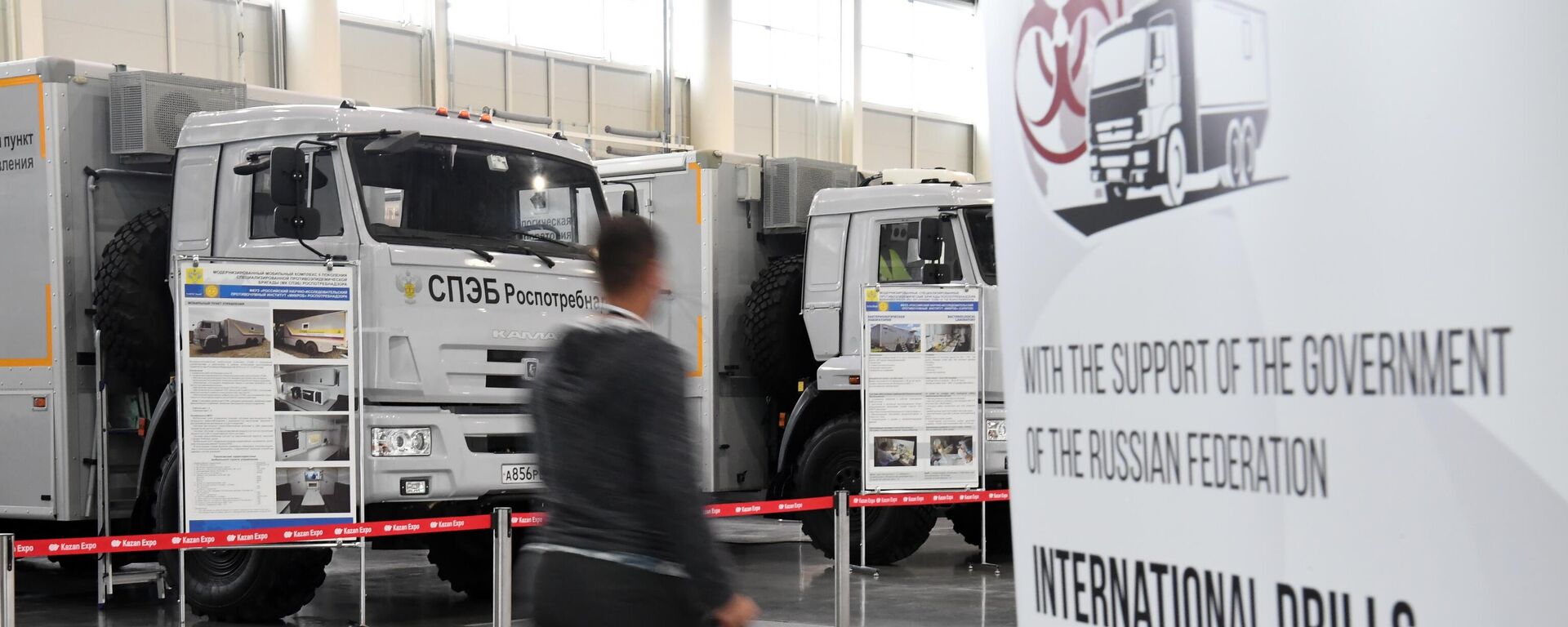https://en.sputniknews.africa/20231002/transcending-borders-for-global-health-russian-and-african-doctors-team-up-in-ivory-coast-1062495116.html
Transcending Borders for Global Health: Russian and African Doctors Team Up in Cote d'Ivoire
Transcending Borders for Global Health: Russian and African Doctors Team Up in Cote d'Ivoire
Sputnik Africa
Healthcare builds bridges spanning several thousand kilometers, enabling Russian and Ivorian professionals to collaborate effectively in the capital city of... 02.10.2023, Sputnik Africa
2023-10-02T18:58+0200
2023-10-02T18:58+0200
2023-10-02T19:00+0200
sub-saharan africa
cote d'ivoire (ivory coast)
russia-africa cooperation
health
healthcare
west africa
russia
africa insight
https://cdn1.img.sputniknews.africa/img/07e7/0a/02/1062497780_0:160:3075:1890_1920x0_80_0_0_55188b9251a4fc54c80872aa740a5cec.jpg
Some healthcare professionals from the West African nation do not hesitate to travel to Russia to gain further expertise, while Russian doctors reciprocate by providing assistance to Ivorian healthcare organizations. Sputnik interviewed some of the traveling clinicians on the occasion of International Doctor's Day, which is annually celebrated on the first Monday of October.Many countries observe International Doctor's Day to encourage solidarity and action among doctors worldwide, while paying tribute to their challenging work of saving lives.Russian surgeon Maxim Zhuravel founded the first Center for Cardiovascular Diseases in Ivory Coast. In an interview with Sputnik, Jouravel describes his unique experience settling in Africa, where health infrastructure can be less advanced compared to Russia.The doctor recalled that when he arrived, he found himself alone, without any support or help due to the remoteness of the area where he lived. Against this backdrop, he had to rely on himself, Zhuravel said, highlighting the transformative potential of this experience in promoting professional development, knowledge acquisition and confidence.The physician praised the hospitable and friendly Ivorian community, which showed no prejudice against him. Some patients even speculated that his presence stemmed from the Kremlin's desire to aid the African people, although the reality proved to be more mundane.Gaining Expertise in RussiaDoctor Steve N'Kragbo completed his medical training in Russia under the supervision of Maxim Zhuravel. He also shared his impressions of Russia and the country's healthcare system with Sputnik, stressing that the training proved very enriching, despite the challenges he faced in learning the Russian language. He was able to engage with Russian patients and provide them with medical care.Back in Abidjan, the physician implemented the acquired knowledge by establishing a catheterization room, and then an interventional radiology department.Dr. Louis-Bernard Ehui, who received training in Russia under the supervision of Maxim Zhuravel, shared similar sentiments. The cardiologist emphasized that the quality of teaching in the country is comparable to that of Europe or Canada.The three physicians continue to work together at the Polyclinique Internationale Sainte Anne-Marie (PISAM) in Abidjan and regularly converse in Russian, demonstrating how the medical field surpasses national boundaries.
https://en.sputniknews.africa/20230731/russia-to-send-some-100-mobile-rapid-response-medical-laboratories-to-african-countries-1060954917.html
cote d'ivoire (ivory coast)
west africa
russia
Sputnik Africa
feedback@sputniknews.com
+74956456601
MIA „Rossiya Segodnya“
2023
Sputnik Africa
feedback@sputniknews.com
+74956456601
MIA „Rossiya Segodnya“
News
en_EN
Sputnik Africa
feedback@sputniknews.com
+74956456601
MIA „Rossiya Segodnya“
Sputnik Africa
feedback@sputniknews.com
+74956456601
MIA „Rossiya Segodnya“
cote d'ivoire (ivory coast), russia-africa cooperation, health, healthcare, west africa, russia, africa insight
cote d'ivoire (ivory coast), russia-africa cooperation, health, healthcare, west africa, russia, africa insight
Transcending Borders for Global Health: Russian and African Doctors Team Up in Cote d'Ivoire
18:58 02.10.2023 (Updated: 19:00 02.10.2023) Healthcare builds bridges spanning several thousand kilometers, enabling Russian and Ivorian professionals to collaborate effectively in the capital city of Abidjan, Cote d'Ivoire. Three doctors shared details of this successful partnership with Sputnik.
Some healthcare professionals from the West African nation do not hesitate to travel to Russia to gain further expertise, while Russian doctors reciprocate by providing assistance to Ivorian healthcare organizations. Sputnik interviewed some of the traveling clinicians on the occasion of International Doctor's Day, which is annually celebrated on the first Monday of October.
Many countries observe International Doctor's Day to encourage solidarity and action among doctors worldwide, while paying tribute to their challenging work of saving lives.
Russian surgeon
Maxim Zhuravel founded the first Center for Cardiovascular Diseases in Ivory Coast. In an interview with
Sputnik, Jouravel describes his unique experience settling in Africa, where
health infrastructure can be less advanced compared to Russia.
"Cote d'Ivoire is one of the most developed countries in West Africa […] But when you come here, you are alone, no one can help you, give you advice quickly, while your hospital director is 10,000 km away, [...] you have to rely on yourself. It makes you grow as a professional, strengthen your knowledge, you become more confident," he said.
The doctor recalled that when he arrived, he found himself alone, without any support or help due to the remoteness of the area where he lived. Against this backdrop, he had to rely on himself, Zhuravel said, highlighting the transformative potential of this experience in promoting professional
development, knowledge acquisition and confidence.
The physician praised the hospitable and friendly Ivorian community, which showed no prejudice against him. Some patients even speculated that his presence stemmed from the Kremlin's desire to aid the African people, although the reality proved to be more mundane.
"Since 2019, I have not encountered a single patient with negative feelings towards me because I came from Russia. The reception I have received has been warmly welcoming," he said, adding: "Interestingly, there have been instances where patients have told me to convey their gratitude to Vladimir Putin for sending me here. It is important to note, however, that it was not our president who sent me here, but the patient told me that he knew Putin was the kind of person who would be able to send specialists to treat people."
Gaining Expertise in Russia
Doctor
Steve N'Kragbo completed his medical training in Russia under the supervision of Maxim Zhuravel. He also shared his impressions of Russia and the country's
healthcare system with
Sputnik, stressing that the training proved very enriching, despite the challenges he faced in learning the Russian language. He was able to engage with Russian patients and provide them with medical care.
"Some patients were initially surprised or curious to meet a stranger, while others were indifferent to my background. The main concern was receiving quality care. Most patients prioritize a doctor's competence and empathy over their origin," the Ivorian doctor explained.
Back in Abidjan, the physician implemented the acquired knowledge by establishing a catheterization room, and then an interventional radiology department.
Dr. Louis-Bernard Ehui, who received training in Russia under the supervision of Maxim Zhuravel, shared similar sentiments. The cardiologist emphasized that the quality of
teaching in the country is comparable to that of Europe or Canada.
"There may be some differences in the curriculum, but overall, the specialties are similar. It is important to note that medicine requires humility, so we are open to learning from and sharing knowledge with colleagues from other countries to expand our expertise. We have no reason to feel inferior to those who have studied in the West – our course has been of high quality," he stated.
The three physicians continue to work together at the Polyclinique Internationale Sainte Anne-Marie (PISAM) in Abidjan and regularly converse in Russian, demonstrating how the medical field surpasses national boundaries.


